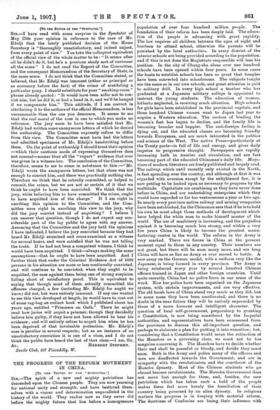rrevaseamserves-spme,vmci
have read with some surprise in the Spectator of May 25th your opinion in reference to the case of Mr. Edalji that the lately published decision of the Home Secretary is "thoroughly unsatisfactory, and indeed unjust, from every point of view." You take the colloquial equivalent of the official view of the whole matter to be : "It seems after all he didn't dolt, but he's a precious shady sort of customer all the same." I do not read the Report of the Committee, and the consequent Memorandum of the Secretary of State, in the same sense. I do not think that the Committee stated, or believed, that Mr. Edalji was innocent (either as principal or as accessory, before the fact) of the crime of mutilating a particular pony. I should substitute for your " smoking-room " phrase already quoted "It would have been safer not to con- vict him, but he did it, or had a hand in it, and we'll be hanged if we compensate him." This attitude, if I am correct in attributing it to the authors of the official Memorandum, is less unreasonable than the one you denounce. It seems to me that the real moral of the case is one to which you make no reference. The jury seem to have been satisfied that Mr. Edalji had written some anonymous letters of which he denied the authorship. The Committee expressly refuse to differ from this view. The Committee must have had the letters and admitted specimens of Mr. Edalji's handwriting before them. On the point of authorship I should. trust their opinion —which their cautious mode of expressing themselves does not conceal—sooner than all the "expert" evidence that ever was given in a witness-box. The conclusion of the Committee, therefore, seems to me to come in substance to this :—" Mr. Edalji wrote the anonymous letters, but that alone was not enough to convict him, and there was practically nothing else. Therefore we think that he actually committed, or helped to commit, the crime, but we are not so certain of it that we think he ought to have been convicted. We think that the jury, while believing Lira to have committed the crime, ought to have acquitted him of the charge." If I am right in ascribing this opinion to the Committee, and the Com- mittee were right in ascribing this view to the jury, why did the jury convict instead of acquitting ? I believe I can answer that question, though I do not expect any con- siderable part of the lay public to agree with my answer. Assuming that the Committee and the jury held the opinions I have indicated, I believe the jury convicted because they had heard Mr. Edalji examined. and cross-examined as a witness for several hours, and were satisfied that he was not 'telling the truth. If he had not been a competent witness, I think he would have been acquitted. I think—always making the same assumptions—that he ought to have been acquitted. And I further think that under the Criminal Evidence Act of 1898 persons in his situation are more or less continually convicted, and will continue to be convicted, when they ought to be acquitted, the case against them being one of strong suspicion falling short of satisfactory proof. This is equivalent to saying that though most of them actually committed. the offences charged, a few (including Mr. Edalji for aught we know) did not, but were entirely innocent. If any one wanted to see this view developed at length, he would have to rout out of some rag-bag an extinct book which I published about ten years ago, entitled "Prisoners on Oath." There he might read how juries will acquit a prisoner, though they decidedly believe him guilty, if they have not been allowed to hear his evidence ; and will entirely refuse to acquit him when he has been deprived of that invaluable protection. Mr. Edalji's case is peculiar in several respects; but as an instance of an unsatisfactory conviction it is one of a class, and I do not think the public have heard the last of that class.—I am, Sir, &c., HERBERT STEPHEN. &vile Club, 107 Piccadilly, W.






































 Previous page
Previous page